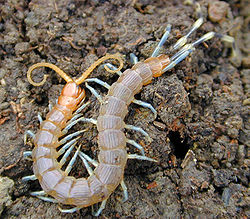百足
Jump to navigation
Jump to search
Chinese
[edit]| hundred | foot; to be sufficient | ||
|---|---|---|---|
| simp. and trad. (百足) |
百 | 足 | |
| alternative forms | 百縮/百缩 dialectal Cantonese 百宿 dialectal Cantonese 百叔 dialectal Cantonese | ||
Pronunciation
[edit]
- Mandarin
- (Standard Chinese)+
- Hanyu Pinyin:
- Zhuyin: ㄅㄞˇ ㄗㄨˊ
- Tongyong Pinyin: bǎizú
- Wade–Giles: pai3-tsu2
- Yale: bǎi-dzú
- Gwoyeu Romatzyh: baetzwu
- Palladius: байцзу (bajczu)
- Sinological IPA (key): /paɪ̯²¹⁴⁻²¹ t͡su³⁵/
- (Standard Chinese)+
- Cantonese
- (Standard Cantonese, Guangzhou–Hong Kong)+
- Jyutping: baak3 zuk1
- Yale: baak jūk
- Cantonese Pinyin: baak8 dzuk7
- Guangdong Romanization: bag3 zug1
- Sinological IPA (key): /paːk̚³ t͡sʊk̚⁵/
- (Taishanese, Taicheng)
- Wiktionary: bak5 lhuuk2
- Sinological IPA (key): /pak̚³² ɬɵk̚⁵⁵/
- (Standard Cantonese, Guangzhou–Hong Kong)+
Noun
[edit]百足
- (literary or Cantonese, Pinghua, dialectal Hakka) centipede (Classifier: 條/条 c)
- (literary) millipede; diplopod
Synonyms
[edit]- (millipede):
Derived terms
[edit]Japanese
[edit]
Etymology 1
[edit]| Kanji in this term | |
|---|---|
| 百 | 足 |
| むかで | |
| Grade: 1 | Grade: 1 |
| jukujikun | |
| Alternative spellings |
|---|
| 蜈蚣 蜈蜙 蝍蛆 |
From Old Japanese, of unknown derivation; some theories include:
- a compound of 向かい (mukai, “facing”, the 連用形 (ren'yōkei, “continuative or stem form”) of verb 向かう (mukau, “to face”)) + 手 (te, “hand”), as the centipede's feet come in facing pairs
- a compound of 六 (mu, “six”) + 十 (ka, “ten”, unusual reading; compare the ga in 五十嵐 (igarashi)) + 手 (te, “hand”), literally "sixty hands"; centipedes have more or less than one hundred legs
- starting as a compound of 百 (momo, “hundred”) + が (ga, ancient possessive particle) + 手 (te, “hand”), shifting phonetically: /momo ɡa te/ → /mukade/
While the latter two theories seem plausible semantically, the devoicing of ga to ka is quite unusual.
The kanji are jukujikun (熟字訓), from Chinese 百足 (bǎizú).
Pronunciation
[edit]Noun
[edit]百足 or 百足 • (mukade) (standard)
(alternative reading hiragana むかぜ, rōmaji mukaze) (Kagoshima dialect)
Usage notes
[edit]As with many terms that name organisms, this term is often spelled in katakana, especially in biological contexts (where katakana is customary), as ムカデ.
Etymology 2
[edit]| Kanji in this term | |
|---|---|
| 百 | 足 |
| ひゃく Grade: 1 |
そく Grade: 1 |
| on’yomi | |
From Middle Chinese 百足 (MC paek tsjowk).
Pronunciation
[edit]Noun
[edit]Usage notes
[edit]The mukade reading is much more common.
See also
[edit]References
[edit]- ↑ 1.0 1.1 Matsumura, Akira, editor (2006), 大辞林 [Daijirin] (in Japanese), Third edition, Tokyo: Sanseidō, →ISBN
- ^ NHK Broadcasting Culture Research Institute, editor (1998), NHK日本語発音アクセント辞典 [NHK Japanese Pronunciation Accent Dictionary] (in Japanese), Tokyo: NHK Publishing, Inc., →ISBN
- ^ Kindaichi, Kyōsuke et al., editors (1997), 新明解国語辞典 [Shin Meikai Kokugo Jiten] (in Japanese), Fifth edition, Tokyo: Sanseidō, →ISBN
Further reading
[edit]- Etymology at Gogen-Allguide (in Japanese)
- Etymology at Nihon Jiten (in Japanese)
Miyako
[edit]| Kanji in this term | |
|---|---|
| 百 | 足 |
| Grade: 1 | Grade: 1 |
| Alternative spelling |
|---|
| 蜈蚣 |
Noun
[edit]百足 (nkaji)
Oki-No-Erabu
[edit]| Kanji in this term | |
|---|---|
| 百 | 足 |
| Grade: 1 | Grade: 1 |
| Alternative spelling |
|---|
| 蜈蚣 |
Noun
[edit]百足 (mukaji)
Toku-No-Shima
[edit]| Kanji in this term | |
|---|---|
| 百 | 足 |
| Grade: 1 | Grade: 1 |
| Alternative spelling |
|---|
| 蜈蚣 |
Noun
[edit]百足 (nukade)
Categories:
- Chinese lemmas
- Mandarin lemmas
- Cantonese lemmas
- Taishanese lemmas
- Chinese nouns
- Mandarin nouns
- Cantonese nouns
- Taishanese nouns
- Chinese terms with IPA pronunciation
- Chinese literary terms
- Cantonese Chinese
- Pinghua Chinese
- Hakka Chinese
- Chinese nouns classified by 條/条
- zh:Myriapods
- zh:Hundred
- Japanese terms spelled with 百
- Japanese terms spelled with 足
- Japanese terms read with jukujikun
- Japanese terms inherited from Old Japanese
- Japanese terms derived from Old Japanese
- Japanese terms with unknown etymologies
- Japanese compound terms
- Japanese terms spelled with jukujikun
- Japanese terms derived from Chinese
- Japanese terms with IPA pronunciation
- Japanese lemmas
- Japanese nouns
- Japanese terms with multiple readings
- Japanese terms spelled with first grade kanji
- Japanese terms written with two Han script characters
- Japanese words with multiple readings
- Japanese terms spelled with 百 read as ひゃく
- Japanese terms spelled with 足 read as そく
- Japanese terms read with on'yomi
- Japanese terms borrowed from Middle Chinese
- Japanese terms derived from Middle Chinese
- Japanese terms with rare senses
- ja:Arthropods
- ja:Hundred
- Miyako terms spelled with 百
- Miyako terms spelled with 足
- Miyako lemmas
- Miyako nouns
- Miyako terms spelled with first grade kanji
- Miyako terms written with two Han script characters
- mvi:Arthropods
- mvi:Hundred
- Oki-No-Erabu terms spelled with 百
- Oki-No-Erabu terms spelled with 足
- Oki-No-Erabu lemmas
- Oki-No-Erabu nouns
- Oki-No-Erabu terms spelled with first grade kanji
- Oki-No-Erabu terms written with two Han script characters
- okn:Arthropods
- okn:Hundred
- Toku-No-Shima terms spelled with 百
- Toku-No-Shima terms spelled with 足
- Toku-No-Shima lemmas
- Toku-No-Shima nouns
- Toku-No-Shima terms spelled with first grade kanji
- Toku-No-Shima terms written with two Han script characters
- tkn:Arthropods
- tkn:Hundred
